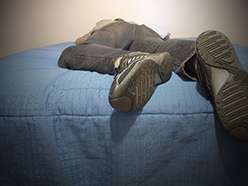Schoolies advised to sleep it off
Sleepless schoolies are being urged to take a nap or sleep-in when the party dies down, with new QUT research revealing young people are "significantly" riskier when tired.
Kalina Rossa, a sleep researcher with QUT's Centre for Accident Research & Road Safety - Queensland (CARRS-Q), measured the effects of restricted sleep on young people aged 18-24 and found they were more likely to undertake risky activities for example having unprotected sex, drink driving and taking drugs.
"The study found that when young people had three to four hours less sleep than usual, they had slower reaction times, were moodier and more impulsive," she said.
"If you put that into a Schoolies' context where young people who are going to be sleep-deprived as well as possibly under influence of alcohol - it is really a double whammy - the risks are even higher."
Ms Rossa said her advice to schoolies who want to stay safe was take a nap, sleep-in but probably most importantly have a party plan and be aware of your surroundings.
She said Schoolies was traditionally a time where young people felt invincible and this attitude coupled with a lack a sleep could have dire consequences.
"We don't want to see people injured or killed because they have been reckless," she said.
Ms Rossa said while everyone needed a good night sleep, young people might be particularly vulnerable because the decision making part of the brain did not fully develop until the age of 25, and this part was affected by the negative effects of sleep loss.
"What this means is that the part of the brain that is responsible for problem solving and impulse control - changes when we haven't gotten enough sleep, and because young people are still developing in this area, a lack of sleep may cause them to make poor choices," she said.
As part of the study, Ms Rossa said when young people had their sleep reduced, they not only felt "sleepy" but their reactions were slower and when forced to make decisions, they tended to choose impulsively - as in whatever comes to mind first.
"This study found that when tired, young people make risky decisions which are likely to be reflected in the real world. That is the real concern," she said.
Provided by Queensland University of Technology




















